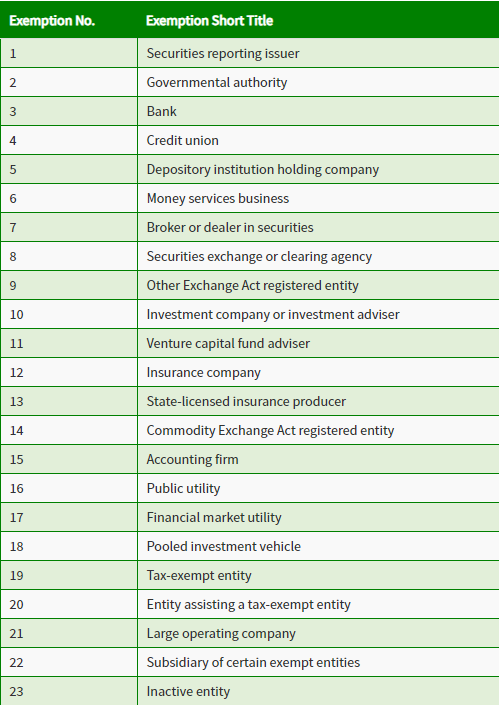Beginning January 1, 2024, the U.S. Department of Treasury’s Financial Crimes Enforcement Network’s (FinCEN) new reporting requirements will go into effect. These changes will require millions of small business owners to file a form called the “Beneficial Ownership In formation (BOI) Report”. 
We know you’ll have questions, so we will be sending out a number of emails to all clients in the coming weeks to ensure everyone is prepared. Anticipating some of those questions, please use the following as an “FAQ” for the changes.
What is the Corporate Transparency Act? Why is it Important?
The Corporate Transparency Act, originally enacted in 2021, was an attempt by Congress to protect against money laundering and the financing of terrorism by attempting to collect more information from business owners.
Who needs to file a BOI Report? Does this apply to me?
Most companies will be subject to filing the BOI Report. Any corporation, LLC, or similar entity formed by/in the United States or Tribal Government through the Secretary of State, Corporation Commission, or equivalent governmental agency is considered a “domestic reporting company”, and must file. Some foreign companies that do business in the United States will also be subject to this filing — if that’s you, please contact our office or your tax professional for more information to see if you are included.
When will I need to begin reporting?
Companies created before January 1, 2024 must file their initial report no later than January 1, 2025. (If you’re on the fence about opening that business, let this be the push you need to get it done before the end of the year!)
(EDITED TO REFLECT DECEMBER 2023 FINCEN UPDATE) For companies created in 2024, a report will need to be filed within 90 calendar days of the date on which it receives notice that it has become effective.
For companies created in 2025, a report will need to be filed within 30 calendar days of the date on which it receives notice that it has become effective.
What kind of information will need to be reported?
You will need to report the business’ information, and specifically, the “beneficial owner’s” information. For the business, you need to expect to report the following information for your business entity:
(1) full legal name,
(2) any trade or “doing business as” names,
(3) complete current street address of the principal place of business,
(4) jurisdiction of formation, and
(5) taxpayer identification number.
The beneficial owner, who can be identified as an individual who has substantial control over the company (25% or more of the company’s interest, and/or has authority to make important decisions about the company’s operations (if you have questions about whether you should be included in the report, please reach out!)), will need to report their:
(1) full legal name,
(2) date of birth,
(3) complete current residential street address (except in the case of a company applicant who forms or registers an entity in the course of the company applicant’s business, who has to provide the street address of the business),
(4) unique identifying number and the issuing jurisdiction from either a current (i) U.S. passport, (ii) state or local ID document, (iii) driver’s license, or (iv) if the individual has none of those, a foreign passport, and
(5) an image of the chosen above document.
How often will I need to report?
FinCEN has not yet indicated how often these reports will be due – expect an update from us once FinCEN releases this information. We do know, however, that changes to company or beneficial owner information will need to be reported within 30 days of the change. The report will also need to be re-filed within 30 days in the event that the report contains an error.
Are there filing fees to file this report?
No, there are no filing fees associated with the BOI report. Please note, however, that if you choose to retain our firm, another firm, or a tax professional to help with the filing, there may be fees associated with that service.
Who will be able to access this information?
The information reported on the BOI is not public record, although the information will be available to a selection of individuals, including the following:
(1) federal agencies engaged in national security, intelligence and law enforcement,
(2) state law enforcement agencies with a court order,
(3) the Treasury Department,
(4) financial institutions with the company’s consent,
(5) government regulators of financial institutions, and
(6) certain foreign authorities requesting information through a U.S. agency.
What if I choose to not file this report?
We get it, disclosing personal information can feel onerous, and like an invasion of privacy, but failure to comply may come with stiff penalties. Civil penalties may include a daily fine of $500, up to $10,000. Criminal penalties, including jail time, may also be imposed for failure to comply.
Are there exemptions?
Yes, there are 23 specific types of entities that are exempt from filing a BOI Report with FinCEN – the following table can be used as a quick reference to see if an exemption applies to you:
If you believe one of these exemptions applies to you, we strongly suggest consulting our firm, another law firm, or your tax professional to confirm your reporting requirements. You can also do your own research on all of the above using FINCEN’s Small Entity Compliance Guide as a resource.
We know this is a lot of information, and that it may be overwhelming. We encourage you to use us as a resource as this change is implemented — schedule some time with a member of our team so you can ask questions and become familiar with these filing expectations.

